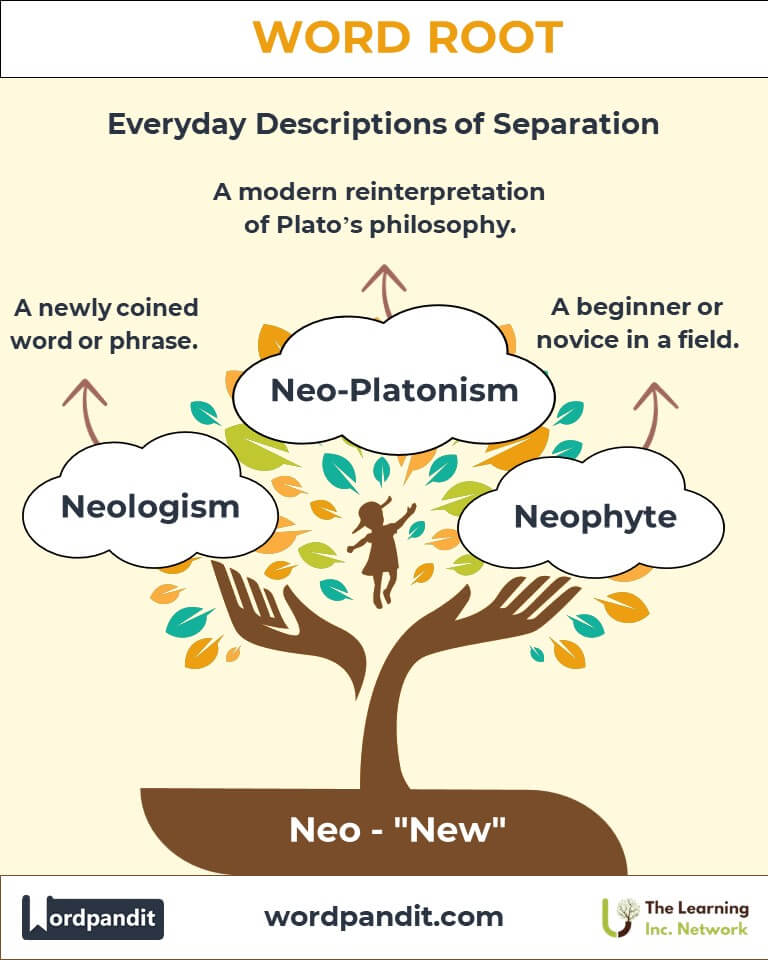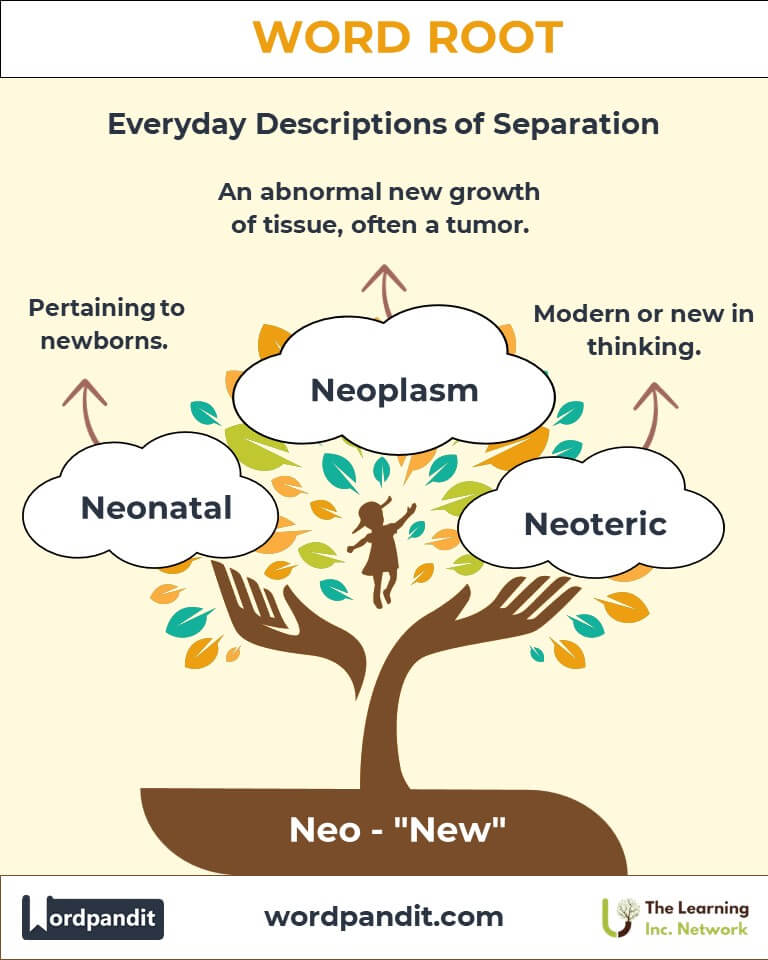Neo: The Root of New Beginnings in Language and Innovation
Byline:
Discover the dynamic potential of the root "Neo," derived from the Greek word "neos," meaning "new." This versatile root finds its way into words that signify innovation, birth, and reimagination, from neologism to neonatal, shaping both everyday and specialized vocabularies.

Table of Contents
- Introduction: The Power of "Neo"
- Etymology and Historical Journey
- Mnemonic: Unlocking the Power of "Neo"
- Common "Neo"-Related Terms
- "Neo" Through Time
- "Neo" in Specialized Fields
- Illustrative Story: "Neo" in Action
- Cultural Significance of the "Neo" Root
- The "Neo" Family Tree
- FAQs about the "Neo" Word Root
- Test Your Knowledge: "Neo" Mastery Quiz
- Conclusion: The Living Legacy of "Neo"
Introduction: The Power of "Neo"
What do neologisms, neonates, and Neo-classical art have in common? They all trace their origins to the Greek root "neo," meaning "new." Pronounced "nee-oh," this root is a cornerstone in language, describing everything from fresh ideas to the dawn of life. "Neo" captures the spirit of reinvention and creativity, finding relevance in fields as diverse as linguistics, medicine, and technology.

Etymology and Historical Journey
The root "neo" stems from the Greek word "neos," signifying "young," "fresh," or "new." As Greek culture influenced the Roman Empire and later the Renaissance, "neo" found a foothold in Latin and eventually English. During the Enlightenment, the term surged in popularity, symbolizing renewal in art, science, and philosophy. Today, it embodies progress, from neonatal care to neoteric inventions.
Mnemonic: Unlocking the Power of "Neo"
To remember "neo," imagine a neon sign glowing brightly, symbolizing something vibrant and new.
Mnemonic Device:
"Neo glows with newness, lighting up the path to innovation!"
Common "Neo"-Related Terms
- Neologism
Pronunciation: nee-uh-loh-jiz-um
Definition: A newly coined word or phrase.
Example: "The rise of social media has led to countless neologisms like 'selfie.'" - Neonatal
Pronunciation: nee-oh-nay-tuhl
Definition: Pertaining to newborns.
Example: "The neonatal unit specializes in the care of premature babies." - Neophyte
Pronunciation: nee-oh-fite
Definition: A beginner or novice in a field.
Example: "Though a neophyte in coding, she quickly mastered the basics." - Neoplasm
Pronunciation: nee-oh-plaz-um
Definition: An abnormal new growth of tissue, commonly a tumor.
Example: "The doctor detected a benign neoplasm during the examination." - Neo-Classical
Pronunciation: nee-oh-klass-i-kuhl
Definition: A revival of classical art and culture.
Example: "Neo-Classical architecture emphasizes symmetry and grandeur."
"Neo" Through Time
- Neologism (18th Century): Coined during the Enlightenment to describe innovative words, reflecting society's focus on intellectual progress.
- Neo-Classical (19th Century): A term highlighting the resurgence of classical ideals in art and architecture during a period of European cultural revival.
"Neo" in Specialized Fields
- Medicine: Neonatal - Focuses on the health and development of newborns.
Relevance: Critical in reducing infant mortality rates. - Linguistics: Neologism - Represents linguistic evolution.
Relevance: Tracks cultural shifts and technological advancements. - Art and Design: Neo-Classical - Combines classical elements with contemporary styles.
Relevance: Demonstrates timeless aesthetics in modern works. - Science: Neoplasm - Vital for understanding cancer and its treatment.
Relevance: Helps differentiate between benign and malignant growths.
Illustrative Story: "Neo" in Action
Dr. Elena Ramirez, a neonatal specialist, worked tirelessly to save a premature infant. Inspired by her efforts, a writer coined the term "neo-hope" in a neologism-filled blog post about resilience. Meanwhile, an artist in the same city unveiled a neo-classical mural symbolizing the child’s journey. Each person, connected by the root "neo," celebrated the beauty of new beginnings.
Cultural Significance of the "Neo" Root
"Neo" captures the essence of renewal and progress in culture. From Neo-classical movements that redefined art to neologisms that adapt language to modern needs, this root reflects humanity’s perpetual quest for growth and innovation. In philosophy, "neo" often signals a fresh interpretation of ancient ideas, bridging past wisdom with future possibilities.

The "Neo" Family Tree
- Nov (Latin: "new")
- Novel: A new or unique story.
- Innovate: To introduce something new.
- Gen (Greek: "birth")
- Generate: To bring into existence.
- Genesis: The origin or beginning.
- Re- (Latin: "again")
- Renew: To make new again.
- Rejuvenate: To restore youthfulness.

FAQs About the "Neo" Word Root
Q: What does "neo" mean?
A: "Neo" means "new" or "recent," derived from the Greek word "neos." It is used to indicate something fresh, modern, or recently developed, whether in language (neologism), art (Neo-Classical), or science (neonatal).
Q: How is "neo" significant in medicine?
A: In medicine, "neo" appears in terms like "neonatal" (newborn care) and "neoplasm" (new tissue growth, often a tumor). These terms highlight the focus on beginnings—whether it’s the start of life or the formation of abnormal growths.
Q: What is a neologism, and why is it important?
A: A neologism is a newly coined word or expression. It reflects how language evolves with societal, technological, and cultural changes. Words like "selfie" and "blog" started as neologisms and became mainstream, marking shifts in communication and lifestyle.
Q: What does Neo-Classical mean in art and architecture?
A: Neo-Classical refers to the revival of classical art and architecture styles, particularly from Ancient Greece and Rome. This movement emerged in the 18th century, focusing on symmetry, simplicity, and grandeur.
Q: What is the difference between a neophyte and a novice?
A: While both mean a beginner, "neophyte" often emphasizes someone starting something entirely new, such as joining a religion or learning a skill for the first time. "Novice," on the other hand, can apply to someone inexperienced but not necessarily new to the field or activity.
Test Your Knowledge: "Neo" Word Root Quiz
1. What does "neo" mean?
2. Which field uses "neonatal"?
3. What does "neologism" refer to?
4. What is "Neo-Classical" associated with?
5. What does "neoplasm" describe?
Conclusion: The Living Legacy of "Neo"
The root "neo" encapsulates humanity's endless quest for innovation and renewal. Whether shaping new words, caring for newborns, or reviving classical ideals, "neo" remains a vital force in language and culture. Its legacy inspires us to embrace change, celebrate beginnings, and imagine a brighter future.












